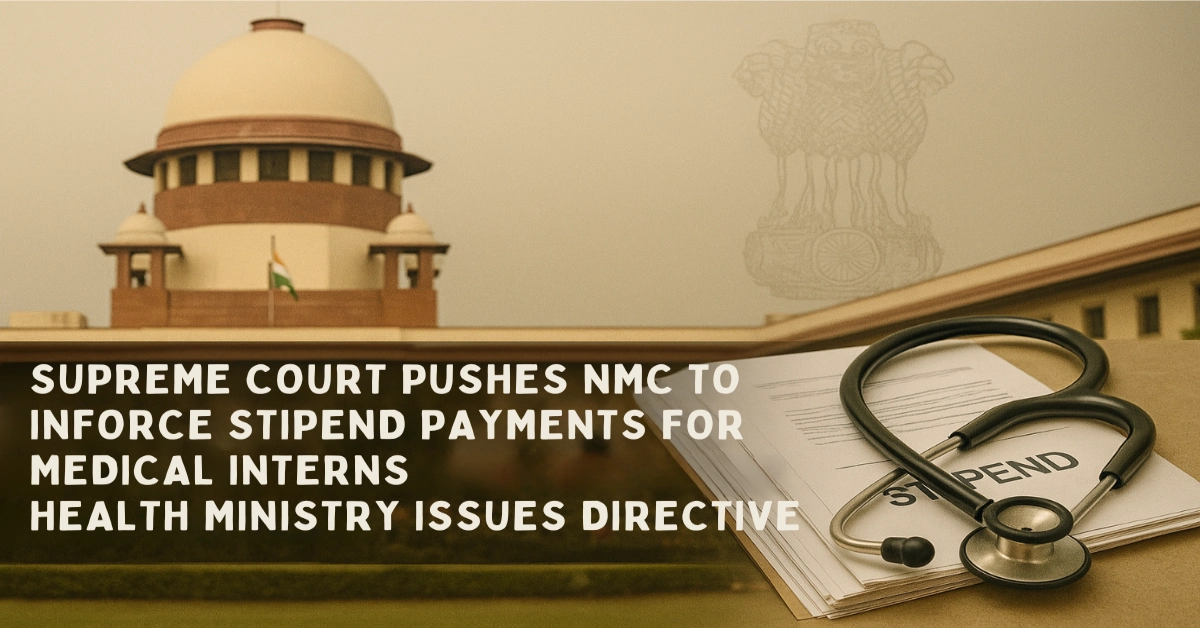The long-standing issue of non-payment of stipends to medical interns and junior doctors has resurged at the national level. Following sharp observations by the Supreme Court of India, the Ministry of Health and Family Welfare has directed the National Medical Commission (NMC) to take strict and immediate action against medical colleges that fail to pay the mandated stipends to MBBS interns, Junior Residents (JRs) and Senior Residents (SRs).
This directive follows the SC’s remark that the NMC has not taken sufficient steps to ensure transparency in stipend disbursement, despite earlier notifications.
Why the Issue Matters: Stipend as a Right, Not a Favour
Stipend for medical interns is not an optional benefit; it is a statutory and ethical obligation of teaching hospitals and medical colleges.
Interns contribute directly to patient care, emergency duty, ward work, documentation, and hospital operations.
Therefore, denying stipends affects both morale and livelihood, especially for fresh graduates from middle-class backgrounds.
However, several medical institutes, especially private ones, have been repeatedly found withholding or underpaying stipends.
Background: Supreme Court’s Warning to NMC
On 28 October 2025, the Supreme Court strongly questioned the NMC for “failure to ensure compliance” regarding stipend payment rules.
Key Observations by the Supreme Court:
- Medical colleges must publish stipend details clearly.
- NMC must enforce its own July 11, 2025, directive, which required institutions to disclose:
- Tuition fee structure
- Hostel fees
- Stipend amount & payment status for interns & residents
- Failure to disclose or pay stipends must lead to regulatory consequences.
The SC also highlighted that the NMC had issued notices earlier, but did not take meaningful follow-up action.
Health Ministry’s Directive to NMC
In an official communication to the NMC Secretary, the Health Ministry has now ordered the Commission to:
“Examine the matter and take appropriate action.”
This means the NMC is now legally and administratively bound to initiate action, ranging from warnings to withdrawal of permission to admit students.
Regulatory Action NMC Can Take
Under the following regulations, NMC is empowered to penalise non-compliant institutions:
| Regulation Name | Possible Action | Applicability |
|---|---|---|
| Establishment of Medical Institutions Assessment & Rating Regulations, 2023 (Reg. 30 & 31) | Penal measures, including fines | All medical colleges |
| Maintenance of Standards of Medical Education Regulations, 2023 (Reg. 8) | Suspension or warning | Teaching institutes |
| PGIMER Regulations (Reg. 9.1 & 9.2) | Action against PG training hospitals | PG institutions |
Possible Consequences for Colleges:
- Show-cause notices
- Financial penalties
- Reduction in MBBS/PG seats
- Withdrawal of recognition
- Suspension of admissions
Why Many Medical Colleges Default on Stipend Payments
The common reasons include:
- Private colleges use interns as a free workforce
- Poor financial management by institutions
- Lack of strict NMC enforcement until now
However, none of these reasons legally justify non-payment.
What Interns and Medical Students Should Do Now
| Action | Why it Matters |
|---|---|
| Check your college website for stipend disclosure | Mandatory by NMC |
| Demand a written stipend clause in the internship joining letter | Proof for grievance |
| Keep payment receipts/records | Needed for complaint/escalation |
| File a formal complaint with NMC if unpaid | Now backed by SC and the Health Ministry |
Impact on Indian Medical Education
This intervention marks a critical turning point in the conversation around medical workforce dignity. Ensuring stipend transparency is essential for:
- Fair professional treatment of young doctors
- Improving morale and training quality
- Reducing exploitation in private institutions
- Strengthening trust in the medical education system
The Health Ministry’s directive and the Supreme Court’s criticism have effectively placed the NMC under pressure to act decisively. Now, medical colleges cannot ignore stipend rules without facing strict consequences.
The coming months will reveal whether:
- Actual penalties are imposed on defaulting colleges
- Stipend transparency becomes enforceable nationwide
For medical interns and young doctors, this development is a much-needed step toward dignity, fairness, and accountability in Indian medical education.

